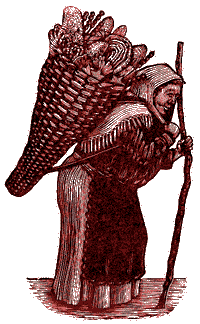return to Home Page
or move on to Goddess Benzai-Tennyo, next chronologically,
or use Her Cyclopedia Index
Befana, Buffoonish-Hag.
BAF*N*
Alternate meanings: Puppet, Goblin.
[to Whom the eleventh day of April, day 101, is dedicated]

Geography/Culture: Italian folk-belief.
Linguistic Note: feminine word in my Italian/English dictionary, but neither puppet nor goblin is provided with "befana" as a translation of these words in the English/Italian section. Several words with meanings such as "ghost", "spirit", and in one case "demon" are given for goblin. Beffa, 'trick, joke', beffardo, 'jester, banterer', beffare, 'to laugh at, ridicule' and beffato, 'jeerer, mocker' which follow the befana entry, would appear to be related Italian words, as would the Spanish befa, 1) 'jeering, mocking, scoffing, taunting', 2) 'blubber-lipped' (from befadura, 'scoff, taunt, movement of lips (as a horse) and knock-kneed', which through bufo, -a, 'comic, farcical', provide us with our English buffoon. {In consideration of these things I suggest the meaning given as reasonably suitable for Befana. That Her name may be a corruption of Epiphany, (Italian Epifania), has also been suggested by some scholars.
Description: Good natured but ugly old Hag; blubber-lipped, knock- kneed Goddess of the Old Year; She Who leaves pres ents in children's stockings on the Eve of the Epiphany; [She Who arranges the expulsion of demons with noise]; [She Who recommends the use of 'the need for cleanliness' as an excuse for non-participation in Christian events].
Her legend (some parts of which appear to be pre- Christian) says she was invited by the three kings to join them in adoring the babe. She replied She was too busy cleaning Her house. Later, having decided to join them She set out but became lost. Every year She now comes looking for him.
To Whom Sacred: sweet-meats and candy (with which She fills the stockings of good children); stones and charcoal (with which She fills the stockings of naughty children); rag-doll effigy of Herself.
Festival: Hang Out Befana, 16th January, (ie. 12th Night, Eve of Epiphany), when young and old assemble with trumpets, tambourines, drums and tin horns to make a great noise in Her honor. In some places singers and musicians serenade the houses and rag-doll effigies of Her are displayed in windows.
Male Associate: perhaps Santa-Klaus can be interpreted as Her male counterpart.
Titles/Variants, etc:
- The worship of Cybele, She-With-the-Axe, Who was well known in Rome under the title of Magna-Mater, Great-Mother, was associated with numerous instruments including tambourines.
- Perhaps, as a divine comedienne, Befana, Buffoonish-Hag, can be appro priately associated with Greek Iambe, She-Who-Limps-Along.
- She is also called La-Strega, The-Witch, below.
- She is also called
La-Vecchia, The-Old-Woman.
- Befana, Buffoonish-Hag, has affinities with German Percha, Shining-One, Who is also active on 12th night.
- She is sometimes fore-titled Saint,.
Source: Funk & Wagnall Folklore, Mythology and Legend, 131; Walker Women's Dictionary of Symbols and Sacred Objects, 404; Latin, Italian, Spanish, and Etymological dictionaries. Illustration:
La-Strega, The-Witch.
L1STrAG1
Alternate meanings: The-Sorceress, Wisewoman.
Geography/Culture: Italy.
Linguistic Note: strega from the imitative Greek sigma- tau-rho-iota-xi, Latin strix 1) A night bird [owl] so named for its shrieking cry. 2) A channel or fluting on a column; from Greek sigma-tau-rho-iota-zeta-omega, Latin strideo-- 'to make or utter any harsh, shrill, hissing, whistling, grating or creaking sound'. Latin strix, from Greek sigma-tau-rhi- iota- zeta-omega, ('the screecher'), 1) The screech-owl, which was believed to suck the blood of young children. 2) A furrow, channel, groove, flute. [Possibly] related English words: strident, stridulous, scream, screech, shriek.
To Whom Sacred: the sreech-owl (ie: Tyto Alba, also known as the barn-owl.)
Titles/Variants, etc:
- Alternate name for Befana, Buffoonish-Hag, above.
Sources: Holm gren Owls in Folk lore and Natural History, 17. Illustration: Science News, Aug 28 1993, p 133.
Worked on file: October, June 1995; October 1993; August 1991; July 1990.
Return to the top of this document.
